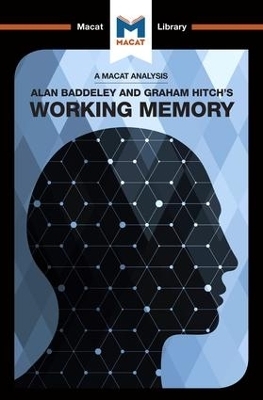
An Analysis of Alan D. Baddeley and Graham Hitch's Working Memory
Macat International Limited (Verlag)
978-1-912128-72-3 (ISBN)
The work of memory researchers Alan Baddeley and Graham Hitch is a prime example of the ways in which good critical thinkers approach questions and the problems they raise.
In the 1960s, researchers into human memory began to understand memory as comprising not one, but two systems. The first was a short-term system handling information for mere seconds. The second was a long-term system capable of managing information indefinitely. They also discovered, however, that short-term memory was not simply a ‘filing cabinet,’ as many had thought, but was actively working on cognitive – or mental – tasks. This is how the phrase “working memory” developed. The hypothesis remained unproven, however, presenting Baddeley and Hitch with the problem of working out how to produce definitive evidence that short term memory was a working system that actively manipulated and processed information.
They responded by designing a series of ten experiments aimed at showing just this – presenting the results in their 1974 article, ‘Working memory.’ The research was a masterpiece of problem-solving that proved revelatory. The authors not only generated new solutions and made sound decisions between alternative possibilities – they also showed that short-term memory is indeed an active system responsible for information processing and managing, while also influencing attention, reasoning, reading comprehension and learning.
While their work has since been refined by others, Baddeley and Hitch’s problem-solving approach helped to create the dominant understanding of working memory that underpins psychological research throughout the world today.
Dr Birgit Koopmann-Holm holds a doctorate in Psychology from Stanford University. She currently teaches in the Department of Psychology at Santa Clara University, California. Dr Alexander O’Connor did his postgraduate work at the University of California, Berkeley, where he received a PhD for work on social and personality psychology.
Ways in to the Text Who were Alan Baddeley and Graham Hitch? What does Working Memory Say? Why does Working Memory Matter? Section 1: Influences Module 1: The Author and the Historical Context Module 2: Academic Context Module 3: The Problem Module 4: The Author's Contribution Section 2: Ideas Module 5: Main Ideas Module 6: Secondary Ideas Module 7: Achievement Module 8: Place in the Author's Work Section 3: Impact Module 9: The First Responses Module 10: The Evolving Debate Module 11: Impact and Influence Today Module 12: Where Next? Glossary of Terms People Mentioned in the Text Works Cited
| Erscheinungsdatum | 10.07.2017 |
|---|---|
| Reihe/Serie | The Macat Library |
| Verlagsort | London |
| Sprache | englisch |
| Maße | 129 x 198 mm |
| Gewicht | 112 g |
| Themenwelt | Geisteswissenschaften ► Philosophie |
| Geisteswissenschaften ► Psychologie ► Allgemeine Psychologie | |
| Geisteswissenschaften ► Psychologie ► Verhaltenstherapie | |
| Geisteswissenschaften ► Sprach- / Literaturwissenschaft ► Anglistik / Amerikanistik | |
| Sozialwissenschaften ► Pädagogik | |
| Sozialwissenschaften ► Politik / Verwaltung ► Politische Theorie | |
| ISBN-10 | 1-912128-72-1 / 1912128721 |
| ISBN-13 | 978-1-912128-72-3 / 9781912128723 |
| Zustand | Neuware |
| Haben Sie eine Frage zum Produkt? |
aus dem Bereich


